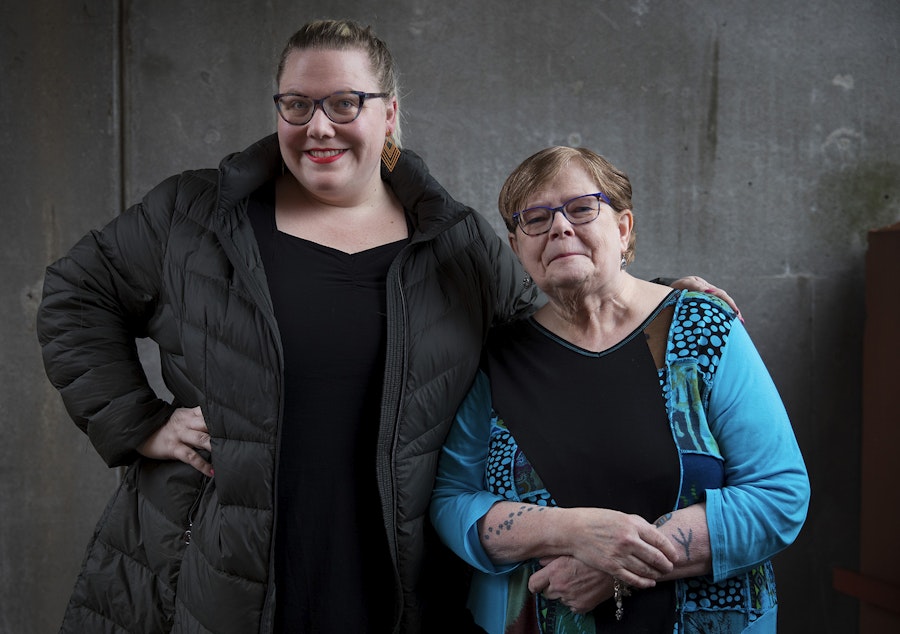Girls can be heroes, depending on what books you read growing up

Fantasy author Tamora Pierce has inspired young people for decades with her stories about strong girls who do things like disguise themselves as boys so they can defend their kingdoms as knights. Among her inspired readers was a young Lindy West, now a New York Times columnist.
We invited West to interview Pierce at KUOW.
Interview Highlights
LW: What got you hooked on fantasy as a genre in the first place?
I was already writing time travel stories when in seventh grade, my homeroom teacher handed me "The Fellowship of the Ring." I finished it at 2:00 a.m. the next morning and cried because I thought there was no more. Then on Monday Mrs. Jacobson handed me the next two books and I was hooked.
Sponsored
You’ve talked about reading and loving those books but noticing that there weren't a lot of women warriors in those books.
The only place in the 1960s where you could reliably find them were historicals. To this day, I still reread "The Witch of Blackbird Pond" and "Mara, Daughter of the Nile." But at the end of each, those characters were asked to come down and live the lives of proper young ladies — or wives, in Mara’s case. And they acquiesced. So I kept looking. But it was Anne McCaffrey who taught me that women could be the hero of the book.
Did it feel revolutionary to take these strong female characters and center them, or was it your instincts?
Well I was angry at all those authors who had the chance to write highly active female heroes and didn't or trashed other women. I didn't understand it. So instead, I wrote what I wanted to read to entertain myself. I wasn't thinking about politics, though there were events that encouraged my wrath.
I had written J. Edgar Hoover in the late 1960s to ask about joining the FBI. The FBI wrote me back and said, actually, girls weren’t allowed to be agents. But that if I worked hard at school and graduated high school, I could apply to become a secretary.
Sponsored
Then there was the time my principal introduced me to the school as “our little women’s libber.” Those kinds of things really chapped my nether parts.
So you wanted to join the FBI. Did you ever thinking about just pulling an Alanna? (Alanna disguised herself as a boy to become a knight.)
Oh, no. By then I started to learn a bit more about the what the FBI was doing, especially their boss. But you know, kids want to try different things. I once said I wanted to be the first woman president. I got laughed at. I said I wanted to be an attorney and my own mother laughed at me. So I decided to go to college and become a psychologist. Evidently that was okay.
You write very frankly and beautifully about the trials and joys of being a young woman. You write about puberty and periods. I’m wondering how your male fan base responds.
I have taken some grief about boys reading my stuff. One teacher asked his boys, “were they embarrassed by a book with girls having periods.”
Sponsored
I mean they live in a world with girls having periods.
That’s exactly what I said. You know, excuse me, but are you going to say to your girlfriend or your wife you don’t want to know about that stuff?
Over the past year, I’ve been thinking about how much of our political discourse is very polarized groups of people yelling at each other. I’m a part of that. And I’ve been thinking more and more about how powerful fiction is in the way that it can get inside of you and change your mind from the inside out. So what I want to know is, what kind of stories do you think we need to save us? And will you save us?
If I could bear to write about contemporary poverty I would, but I can’t because, having been there and done it, I can’t.
Younger people don't believe older people listen and they’re right. They don’t believe older people have any kindness or mercy, except for a very few, sometimes, and they’re right.
Sponsored
But we are seeing more writing about race that’s written around characters that are like real people. It burrows in deeper.
We’re seeing a lot more about people who are ill, or people with family members who are ill and there’s no money coming in.
We're not seeing enough of that writing, but it's out there. If change is going to happen, that’s where you’re going to find it.

